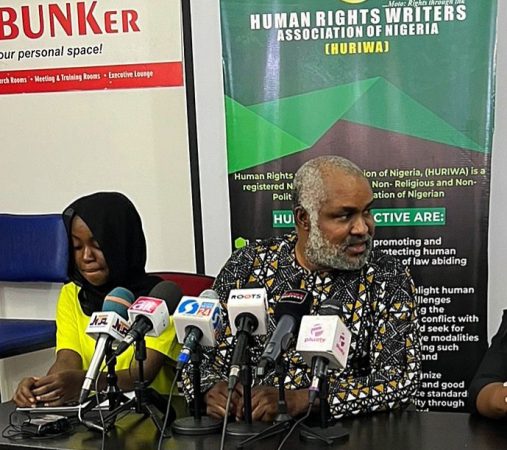The Human Rights Writers Association of Nigeria (HURIWA) has strongly criticized President Bola Tinubu’s selective application of the rule of law, highlighting instances of alleged impunity among his allies. The group expressed concern over the repeated disregard for court rulings and legal standards by individuals closely linked to the President, particularly Musiliu ‘MC Oluomo’ Akinsanya, and questioned the role of security agencies in enabling such actions.
Days after the Court of Appeal in Abuja nullified his position, MC Oluomo controversially assumed office as the National President of the National Union of Road Transport Workers (NURTW) on Tuesday. This decision came despite a ruling from a three-member appellate panel upholding Ibikunle Baruwa as the legitimate leader of the union. The panel reaffirmed a National Industrial Court judgment from March, which recognized Baruwa’s presidency and ordered MC Oluomo to pay N100,000 in costs. However, MC Oluomo’s actions were reportedly carried out with tacit support from law enforcement agencies.
HURIWA, in a press statement, pointed to a broader trend of perceived impunity among figures associated with the Tinubu administration, raising questions about the independence and accountability of institutions meant to uphold the law. The group emphasized that since the pre-election period, MC Oluomo’s conduct has frequently suggested that some individuals are above the law, particularly if they are seen as instrumental to the political objectives of the ruling party. During the Lagos State gubernatorial elections, MC Oluomo’s threats against certain ethnic groups went unpunished, highlighting a pattern of selective enforcement of legal standards.
The advocacy group also noted that despite MC Oluomo’s repeated defiance of legal orders, including recent judgments by the National Industrial Court and the Court of Appeal, security agencies like the police and the Department of State Services (DSS) have shown a tendency to look the other way. HURIWA alleged that the presidency has indirectly sanctioned this behaviour, questioning why President Tinubu’s administration appears to protect individuals like MC Oluomo while cracking down on others.
The controversy surrounding MC Oluomo is just one example of what HURIWA described as “the institutionalization of impunity” among those closely linked to the President. The group pointed to other incidents involving figures associated with the current administration, such as the recent dissolution of the Governing Council of Nnamdi Azikiwe University in Anambra State.
“President Tinubu ordered the removal of the Vice-Chancellor, Prof. Bernard Odoh, and other council members after accusations of illegal appointments and disregard for educational protocols. The intervention, while necessary, raises questions about the president’s selective approach to addressing legal and administrative violations.
“Similarly, the Senate recently removed the Chairman of the Code of Conduct Tribunal (CCT), Danladi Umar, for alleged gross misconduct. The decision, based on Section 157(1) of the Nigerian Constitution, followed numerous allegations of corruption and abuse of power.”
“Though HURIWA welcomed Umar’s removal, it criticized the timing, describing it as “belated” and highlighting that the delay in action suggests a lack of consistent accountability within the system. The Senate’s move to replace Umar with Abdullahi Usman Bello underscores the need for impartiality in governance, but HURIWA warned that selective enforcement undermines the integrity of such actions.
The human rights organization further criticized the extension of service for key figures in law enforcement, such as the Inspector-General of Police (IGP), whose retirement was controversially overturned through a retroactive legal amendment. HURIWA argued that such actions erode public trust in Nigeria’s legal framework, giving the impression that loyalty to the President, rather than adherence to the rule of law, determines who faces consequences.
HURIWA also expressed concern over the silence of President Tinubu during past incidents involving his close allies. It recalled that during the Lagos State gubernatorial elections, MC Oluomo reportedly made threatening statements against Igbo communities, which were widely condemned but left unaddressed by the then-president-elect. The group highlighted that MC Oluomo’s tenure at NURTW has been marred by allegations of violence and internal crises, often with the apparent support of the police, yet the presidency has taken no action to curb his excesses.
The association warned that the continued tolerance of such behaviour threatens to destabilize Nigeria’s democracy, eroding the rule of law and undermining public confidence in the country’s institutions. HURIWA urged the Attorney-General of the Federation, Lateef Fagbemi, and Inspector-General of Police, Kayode Egbetokun, to enforce the judiciary’s rulings without bias, insisting that no one, regardless of their political affiliation, should be above the law.
HURIWA’s statement called on Nigerians to unite in opposing what it termed “a dangerous precedent” of shielding allies of the President from legal accountability. The group emphasized that the country’s democratic stability depends on the fair and consistent application of the rule of law, warning that selective justice could lead to widespread disenchantment and further instability.
The organization concluded by urging President Tinubu to demonstrate leadership by ensuring that justice is not only done but seen to be done, particularly when it involves his political allies. HURIWA asserted that Nigeria cannot afford to allow individuals, no matter how politically significant, to act with impunity while ordinary citizens face the full force of the law for far lesser offenses.
READ ALSO:
- Wife starved of sex for seven years seeks divorce
- Man sentenced to 6 months in prison for intimidating FRSC Officials
- Tinubu: The President for all Nigerians, by Fredrick Nwabufo
- Gusau Explains Plan To Make Super Falcons Rule Africa Again
- OAP Do2dtun Cries Out As Popular Radio Station Owes Him, Colleagues 8 Months Salary


